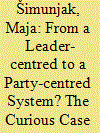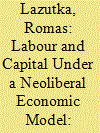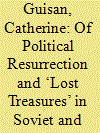| Srl | Item |
| 1 |
ID:
162236


|
|
|
|
|
| Summary/Abstract |
This article analyses the early reforms of perestroika (1985–1989) that aimed to overcome the perceived moral crisis of Soviet society. A close study of the public debates of that time reveals three conflicting perspectives on morality. By situating these debates in the wider context of Soviet and Western intellectual history, this article argues that the Soviet liberal project was part of a broader phenomenon, namely, the apogee of political Romanticism in the USSR. This conclusion, in turn, sheds light on the specificities of the Soviet liberal moral project, which inspired Gorbachev’s reform strategy from 1987 onwards.
|
|
|
|
|
|
|
|
|
|
|
|
|
|
|
|
| 2 |
ID:
162240


|
|
|
|
|
| Summary/Abstract |
It is often argued that the politics of Central Eastern European countries revolve around political leaders. This can inhibit the development of fragile political institutions and the process of democratisation in general. This article examines patterns of media representation of political actors in the transition from a communist to a post-communist setting in the case of Yugoslavia and Croatia. The results show that, although there are significant similarities between the prominence of leaders in the communist and early post-communist eras, in the process of democratisation media attention has shifted significantly from leaders to parties as collectives.
|
|
|
|
|
|
|
|
|
|
|
|
|
|
|
|
| 3 |
ID:
162238


|
|
|
|
|
| Summary/Abstract |
The article examines the organisational transformation of the Russian defence industry during the period of privatisation and radical market reforms. The study is based on the results of an original large-scale longitudinal survey of the directors (CEOs) of the industry. We find that over a decade of transition, 1996–2006, Russian defence industry managers were able largely to preserve the production potential of their enterprises and make them capable of operating under market conditions. Coupled with the restoration of government orders and the 2020 rearmament programme, these newly acquired market skills have contributed to the impressive revival of the Russian defence industry in the Putin era.
|
|
|
|
|
|
|
|
|
|
|
|
|
|
|
|
| 4 |
ID:
162237


|
|
|
|
|
| Summary/Abstract |
This study investigates the split of national income between labour and capital in Lithuania and its distributional implications. It shows that the neoliberal economic development model embraced by Lithuania since regaining independence in 1991 produced significant economic growth. However, this growth was based on suppressing wages, keeping taxes on capital low and exporting cheap labour to the core EU countries. This resulted in high inequalities in income and wealth that have contributed to a deep socio-demographic crisis in the country. It is argued that in order to make Lithuanian capitalism socially sustainable, the neoliberal model of development needs to be reconsidered and modified.
|
|
|
|
|
|
|
|
|
|
|
|
|
|
|
|
| 5 |
ID:
162239


|
|
|
|
|
| Summary/Abstract |
In October 2011, the four ruling coalition parties in Slovakia failed to agree upon updating the European Financial Stability Facility. It was ultimately approved with the help of the opposition in exchange for an early election. This self-destructive behaviour by the ruling coalition remains a puzzle with the only available explanations merely referring to the irrationality of the domestic political elite. Our research tackles this problem using game theory. By focusing on the preferences of the key leaders, this article shows that although the fall of government was the only rational outcome, other factors beyond the scope of rational choice theory can suggest a possible explanation.
|
|
|
|
|
|
|
|
|
|
|
|
|
|
|
|
| 6 |
ID:
162235


|
|
|
|
|
| Summary/Abstract |
Drawing from the central notion in Russian culture of resurrection, and from Hannah Arendt’s concept of political ‘lost treasures’, this article analyses initiatives for democratisation during the Soviet Thaw (1956–1964) and perestroika (1985–1991); and current attempts to recall the legacy of medieval Pskov and Novgorod’s republican institutions. Retrieving memories of civic action matters intellectually and politically because it roots Russian democratisation in alternative national traditions, which, curiously, both Russian democratic activists and Putin supporters dismiss today. The empirical data come from interviews, ethnographic observations, and studies on Russian/Soviet politics and memory.
|
|
|
|
|
|
|
|
|
|
|
|
|
|
|
|
| 7 |
ID:
162234


|
|
|
|
|
| Summary/Abstract |
This article considers the religious and spiritual aspect of the Euromaidan protests; specifically, the role of the Ukrainian Orthodox Church of the Moscow Patriarchate and to what extent the UOC(MP) can justifiably be seen as a tool of Russian ‘soft power’ cultural and ideational influence. It examines the degree of institutional and ideological leverage that Moscow is able to exercise over the Ukrainian church, and then explores the position of the church during the protests, and how this has affected the authority and legitimacy of its standing as an opinion leader in Ukrainian society in the wake of the ‘Revolution of Dignity’.
|
|
|
|
|
|
|
|
|
|
|
|
|
|
|
|